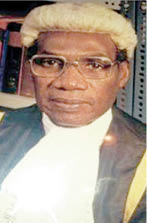Ilọrin Emirate, unlike others in northern Nigeria, has a unique composition and peculiar history. It is dominated by people of different ethnic backgrounds, who came together and adopted Islam as their religion.
Although, Yoruba language serves as the lingua franca of the emirate, their political system is built in line with what is obtainable in other emirates in northern Nigeria.
Unlike other emirates, where some of the revered traditional titles are hereditary, Ilọrin has a slightly different version, where titles are mostly bestowed on indigenes who distinguished themselves as a means of recognising their contributions and encouraging them to do more.
Many of such titles were either not in existence in Ilọrin, or unpopular until the reign of the 8th emir, Sheikh Abdulkadir Shuaiib Bawa, the longest reigning monarch (1919-1959) and maternal grandfather of the current emir.
- Amnesty International condemns killing of protesters, demands investigation
- Inside Nigeria’s unresolved murder cases
He introduced the title of Madawaki into the Ilọrin traditional political lexicon around 1955.
His reign coincided with nationalism and independence, which necessitated the recognition of illustrious sons of Ilọrin, who have distinguished themselves as done to their contemporaries in other emirates in northern Nigeria.
Waziri and Madawaki were thus institutionalised as honorary chieftaincy titles and were among the first to be given to the elite.
Unlike hereditary titles like Balogun, Magaji, Daudu and Alangua, which are only bestowed on family members with entitlements, Madawaki and all the honorary titles can be conferred on anyone at home or in the diaspora. It can be conferred on anyone who the emir deems has merited it in terms of contributions to the community and achievements.
There are no fewer than 30 honorary and over 100 hereditary titleholders in Ilọrin Emirate, which spans over the five local government areas of Ilọrin-east, Ilọrin-west, Ilọrin-south, Asa and Moro.
Some of the honorary titles like Wakili, bestowed on the late pioneer chairman of the Independent Corrupt Practices Commission (ICPC), Justice Mustapha Akanbi and others like the Samaki of Ilọrin, are yet to be filled since the demise of the former recipients.
Madawaki literally means the “head of the Calvary”, that defends the territorial sovereignty of the emirate. It is a military title reserved for very brave, brilliant and energetic individuals. In this case, and with the absence of war, its custodians are patriots who are ready to fight for the interests of the people and the Ilọrin community.
In terms of hierarchy, honorary titles in Ilọrin Emirate are not differentiated by status but given to whoever the emir is convinced deserves it.
The importance of the position depends on the occupant at each point in time. And there is nothing significantly different about the regalia of the Madawaki or any honorary titleholder. Part of its regalia is; the sword, with respect to the demands of his office, and the turban. None of the honorary title holders among the present recipients are biologically related.
Although the dos and don’ts of a Madawaki or any other honorary title holder may not be stated clearly, the recipients are issued appointment letters by the emir. Anyone considered for appointment as a title holder automatically becomes a role model and a community leader. He ensures that the emir, the emirate and Nigerians in general are not disappointed by his actions and comments.
They must defend the interest of the Ilọrin Emirate by using their wealth, experience, contacts and influence.
The Madawaki and other title holders are advisors to the emir on issues pertaining to the interests of Ilọrin.
The first Madawaki of Ilọrin was the late Alhaji Yahaya Madawaki, an accomplished teacher, educationist, administrator, politician and one of the founding fathers of the Northern People’s Congress, who eventually became the first regional minister of health. Weekend Trust gathered that he facilitated the establishment of Ilọrin General Hospital around 1954, which has now been converted to the Kwara State University Teaching Hospital.
The traditional title was conferred on him in 1955, while he died in1998, serving under three emirs, including Ibrahim Sulu-Gambari, who succeeded the emir that appointed him.
After his death, the Madawaki title was not conferred on anyone until sometime in 2006, when the current emir, Sulu-Gambari honoured the late Justice Saidu Kawu.
Kawu was a teacher, administrator, lawyer, judge and statesman who served the country in several capacities. He was the third lawyer and the first judge produced by the Ilọrin Emirate and also served as the chairman of the Constitutional Conference Commission under the late General Sani Abacha. Incidentally, he was one of the several students of the first Madawaki. He died on December 25, 2013.
After his death, no one was conferred with the title of the Madawaki, until 2021, when the emir decided to confer it on Alhaji Yakubu Gobir, a reputable pharmacist, politician and philanthropist with several interventions that cut across religion, education and traditional sectors of the Ilọrin Emirate and beyond. Gobir is the grandson of the first Waziri of Ilọrin, Alhaji Muhammadu Ajayi Gobir.
Before the advent of colonialists, the Ilorin Emirate extended to the present Osun State, Igbomina and Ibolo lands in the southern part of Kwara State, but has been shrunk by the creation of states by succeeding governments.
The evolution of the emirate can be captured in three stages during its pre-colonial existence, the post-colonial stage and after the creation of states.
During its pre-colonial existence, it extended beyond Odo-Otin in Osun State and shrank to the river boundary before Erin Ile in the south. It then metamorphosed from Ilọrin Division to Ilọrin Native Authority Area and the present day system of government.
Throughout the Sardauna era, the nomenclature of its administration was Emir- in-Council with the monarch as the sole authority. It remained so until the end of that era when states were created. The then Kwara State government under Cornelius Theophilus Bamigboye carried out a local government reform in 1968, which changed the system to division instead of emirate and the former Ilọrin Emirate or Ilọrin Authority Area was changed into Insulin Divisions, which remained under the emir.
The Igbomina/Ekiti portion, previously under the emir, was granted autonomy and the Offa/Oyun or Ibolo axis of Ilọrin emirate was also detached to form Oyun division. What used to be the Ilọrin Emirate was then reduced to five local government areas.
Ilọrin Emirate shared a boundary with Lafiagi Emirate in the north at Jebba and also with Share town with Tsaragi.
Although Ilọrin Emirate has history rooted in the Sokoto Caliphate and other northern emirates, the circumstances of each emirate determine which titles are hereditary or honourary. For instance, in many of the northern emirates in the country, the Madawaki title is hereditary, unlike Ilọrin, where it is honorary. This also applies to many other titles.
But one important aspect of the Ilọrin chieftaincy is that it is a reflection of the melting pot nature of the emirate with titles that have Nupe, Yoruba and Hausa-Fulani origins. This explains the existence of titles like the Ajiroba of Ilọrin, yet to be filled after the death of a Lagos-based Alhaji, AbdulSalam Agbabiaka around 1980, Baba Isale, Magaji Are, Magaji Nda, Shettima, Turaki and Asiwaju Ndigbo, among others.
The honorary titles are: Waziri, Turaki, Zanna, Danmasani, Danmadami, Jarma, Talba, Shantali, Shettima, Mufti, Malami Ubandoma, Sarkin Malamai, Wakili, Sardauna, Wambai, Magatakarda, Dan Iya, Tafida, Madawako and Makama, among others.
Contributors to the story: The spokesman of the Emir of Ilọrin and Shettima of Okuta Emirate, Abdulazeez Arowona, spokesman of Ilọrin Emirate Descendants Progressive Union (IEDPU), Imam Abubakar and Alhaji Laziz Ayinla Kolawole (LAK) Jimoh, a historian.

 Join Daily Trust WhatsApp Community For Quick Access To News and Happenings Around You.
Join Daily Trust WhatsApp Community For Quick Access To News and Happenings Around You.

